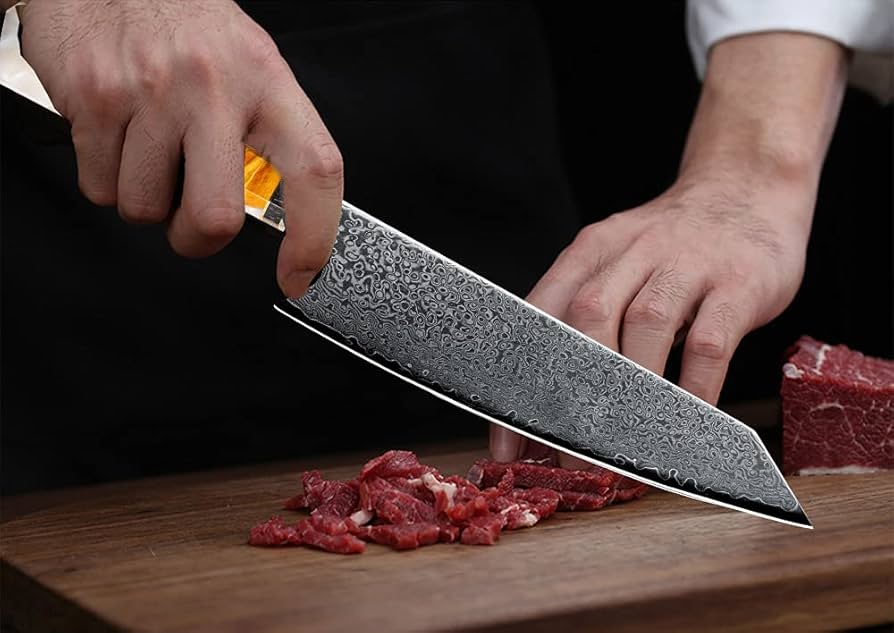Artistic Damascus Knives are known for their beauty and elegance, making them a popular choice among kitchen professionals and enthusiasts. These knives are not only aesthetically pleasing but also renowned for their sharpness and durability. In the world of culinary arts, possessing a high-quality knife is as essential as the skills of the chef. The intricate patterns and superior performance of Artistic Damascus Knives have captivated both professional chefs and home cooks alike, providing a perfect blend of art and functionality.
The history of Damascus steel dates back to ancient times, a tradition that has been preserved through generations. Each knife is a testament to the artisans skill and dedication, embodying a tradition of excellence. Artistic Damascus Knives are a testament to the harmonious blend of traditional techniques and modern innovation, resulting in an indispensable tool for discerning chefs.

Understanding Damascus Steel
Before diving into what makes Artistic Damascus Knives so special, it’s important to understand the steel they are made from. Damascus steel was originally used for manufacturing swords in ancient times due to its resilience and sharpness. The steel is known for its distinctive patterns, reminiscent of flowing water, which are not only beautiful but indicative of the knifes superior quality.
Modern Damascus knives are crafted by forging multiple layers of steel together, a process that enhances both the blade’s durability and its unique pattern. This method also contributes to the knife’s exceptional edge retention, making it an ideal choice for those in the culinary profession who require precision and reliability from their tools.
The Artistic Element
The artistry involved in creating Damascus knives is what sets them apart from other knives. Skilled artisans meticulously fold and hammer different types of steel to create intricate patterns that decorate each blade. This process not only strengthens the knife but also adds a layer of beauty that transforms the knife into a piece of art.
The Craftsmanship Behind Artistic Damascus Knives
The creation of a Damascus knife is a meticulous process that requires expertise and patience. The technique of layering and forging steel can involve hundreds of layers, each contributing to the overall strength and resilience of the knife. This technique results in the blade’s distinct visual patterns and is highly prized in the world of culinary tools.
Techniques Involved
The process of making Damascus steel involves several techniques, including folding steel, forging, and heat treating. By folding the steel, impurities are removed and the strength of the blade is enhanced. The forged knives are then heat-treated to align the steel’s structure, ensuring a hard yet flexible blade, perfect for precise culinary tasks.
The Role of Artistic Damascus Knives in the Kitchen
Artistic Damascus Knives are not only appreciated for their beauty but also for their functionality. The sharpness and strength make them essential tools for precision cutting, slicing, and dicing. Chefs value these knives for their ability to maintain a sharp edge over time, reducing the need for frequent sharpening and ensuring efficiency in busy kitchen environments.
Performance and Efficiency
In the fast-paced environment of a professional kitchen, having a reliable knife is imperative. Artistic Damascus Knives provide excellent performance, allowing chefs to prepare dishes with precision and ease. The weight and balance of these knives are perfectly tuned to offer control, reducing fatigue during prolonged use.
Choosing the Right Artistic Damascus Knife
For kitchen professionals, selecting the right knife is a highly personal choice, influenced by the knife’s balance, weight, and grip. While the aesthetic beauty of Damascus knives is undeniable, it is also important to consider the knife’s functionality. When choosing a knife, professionals must also consider the size and shape of the blade that best fits their needs, whether it’s for slicing meats or finely chopping herbs.
Investment in Quality
An investment in an Artistic Damascus Knife is more than purchasing a tool; it’s acquiring a cherished possession that enshrines a legacy of fine craftsmanship. Though these knives may be more expensive than standard models, their durability and low maintenance needs offer long-term value, making them a worthwhile addition to any professional kitchen.
Preservation and Care of Artistic Damascus Knives
To ensure the longevity and performance of Damascus knives, appropriate care is essential. Experts recommend hand washing these knives and avoiding putting them in the dishwasher to prevent damage and to maintain their beautiful finish.
Storage Tips
Proper storage is equally important to preserve the sharpness and aesthetic appeal of Damascus knives. Using a knife block, magnetic strip, or blade guard can prevent unnecessary dulling and preserve the knifes pattern.
Conclusion: The Timeless Appeal of Artistic Damascus Knives
The allure of Artistic Damascus Knives is timeless, offering a unique combination of functionality and beauty. These knives have set a standard in the world of culinary arts and continue to be a symbol of expertise and craftsmanship. With proper care, they can be a lifelong investment, enhancing your culinary experience by providing precision and beauty in every cut.

FAQs
Why are Artistic Damascus Knives so expensive?
The cost of these knives is due to the intricate process of forging and the skill required to achieve the desired patterns and blade strength, offering unparalleled quality.
Are Damascus knives suitable for beginners?
Yes, they are well-suited for anyone who values a high-quality knife, but beginners should be aware of the importance of proper care to maintain the knife’s quality.
Can Damascus knives be used for all types of cooking?
Absolutely! They are versatile and can be used for a wide range of kitchen tasks, from slicing meats to chopping vegetables efficiently.
To learn more about the fascinating origin and science behind these knives, visit this article.
This article contains affiliate links. We may earn a commission at no extra cost to you.


